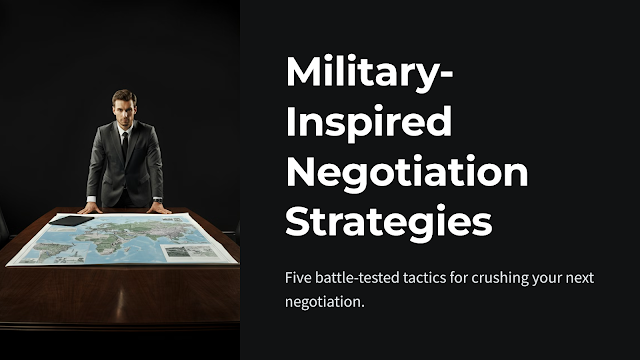Battle-Tested Tactics: 5 Military-Inspired Strategies for Crushing Your Next Negotiation
Ever feel like you’re walking into a negotiation without enough ammo? Well, if there’s anything to be learned from military history, it’s that strategy, timing, and smart resources win wars – and guess what? They’re also your keys to sealing the best deals. Here’s how to turn battle-proven tactics into negotiation gold.
1. “The Normandy Surprise: Hit ‘Em Where They Least Expect It”
During WWII, the Normandy Invasion wasn’t just some storm-the-beach mission; it was a genius plan to catch the Nazis off guard. By attacking a less fortified area, the Allies turned the tide of war in just a few days. Now, let’s apply that to your negotiations.
Imagine you’re in talks with a vendor, and they’re ready to throw the usual sales pitches. But here’s the twist – surprise them with a last-minute proposal that’s too compelling to refuse, like an unexpected volume increase or a joint promotion. Caught off-guard, they’re more likely to accept, even if it means extra concessions on their end. That’s how you seize control.
Pro Tip: Don’t just bring up surprises for the sake of it. Know their weak spots, like gaps in supply or seasonal dips. Hit them where it counts!
2. “Stockpile Smart: Never Be the General Without Supplies”
Napoleon’s Russian campaign taught us a painful lesson: no matter how powerful you are, if your supply chain falls apart, so do you. He marched into Russia with over 600,000 men, but without solid resources or a way to resupply, only about 3% made it home. In negotiations, you’ve got to think like a commander with an unbreakable supply line.
Say your company faces rising material costs, but you’ve secured reliable alternative suppliers ahead of time. When prices spike, and competitors are stuck paying 10-15% more, you’re locked in with your old rates and can push for even better terms. By stockpiling options (or suppliers), you’re ready to negotiate from a position of strength, not panic.
Pro Tip: Diversify your “supplies.” Have backup vendors and research costs so when chaos strikes, you’re the one holding the cards.
3. “The Art of the Strategic Retreat: Give a Little, Win a Lot”
Here’s a move only the pros understand: sometimes, the best way to win is by taking a small, strategic step back. During Napoleon’s Russian retreat, he used partial withdrawals to buy time and preserve resources, holding off total disaster. It’s all about controlled concessions that let you win the war.
In negotiations, a small early concession (like a minor discount or flexible terms) builds trust. Once they’re comfortable, you have the upper hand to negotiate the real prizes: long-term contract terms, exclusivity rights, or preferential pricing. Don’t sweat the small stuff if it gives you leverage for the big wins.
Pro Tip: Plan out which concessions you’re willing to make. Use small trade-offs to set yourself up for major wins down the line.
4. “The Intel Advantage: Know Their Playbook Before You Hit the Field”
In WWII, British forces had an ace up their sleeve: cracking the German Enigma code. By intercepting enemy plans, they knew where and when to strike, cutting down their own losses and securing huge wins. Think of it as the ultimate cheat sheet for negotiations.
Before you sit down, dig into the other party’s background. Have they been forced into deals with higher prices? Do they rely heavily on seasonal sales? Knowing this stuff lets you walk in already understanding their pain points and motivations. It’s like walking in with their playbook.
Pro Tip: Use industry reports, recent earnings calls, or even LinkedIn profiles to get a pulse on your negotiating partner. It’s legal intel, and it’s priceless.
5. “Six Days to Seal the Deal: The Power of Tight Deadlines”
The Six-Day War isn’t famous just because it was short; it’s legendary because of Israel’s swift, decisive strategy. When time is your weapon, you push your opponent into quick (and often favorable) decisions. Speed becomes your friend.
Applying that in negotiations means setting hard deadlines that push the other party to act fast. Need them to sign today? Offer a temporary discount or added benefits that are off the table after 24 hours. They’ll be too focused on the time pressure to haggle over smaller details.
Pro Tip: Keep the deadline realistic but tight enough to create urgency. When time’s ticking, people tend to agree rather than lose the deal.
Wrap-Up: Making Military Strategy Your Negotiation Secret Weapon
Negotiations can feel like battles, but they don’t have to be a fight. With these five military-inspired tactics, you’re not only securing the win but doing it with finesse. Approach every deal like a general – plan your moves, know your resources, and never let the other side see your hand too early. After all, the best negotiators are the ones who know when to hold back and when to strike.



